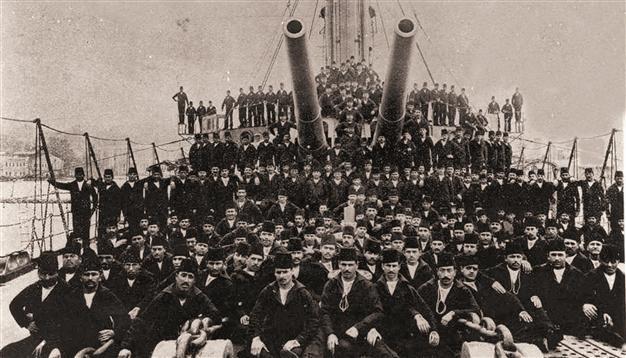The centenary of the Ottoman entry into the First World War
Ayşe Gülnev Osmanoğlu

Ottoman mariners are seen on board the Yavuz (Goeben) battlecruiser. In 1914, the Ottoman Empire acquired the Yavuz and its sister ship the Midilli, the two German-origin ships that bombarded Russia and took the Ottomans into World War I.
Today marks the centenary of the Ottoman Empire’s official entry into World War I. It was today, 100 years ago, that the Russian ports of Sevastopol and Odessa were bombarded by ships of the Imperial Ottoman Navy, under the command of Admiral Wilhelm Souchon. This episode marked the first engagement in World War I by the Ottoman Empire, and remarkably it was carried out without the authorization or knowledge of Parliament, the Cabinet or even the Palace.
A few days later, on Nov. 1, 1914, Russia declared war on the Ottoman Empire, followed by her Allies of the Triple Entente, Britain and France, on Nov. 5, 1914. The war would ultimately lead to the dismemberment of the Ottoman Empire, the abolition of both the Ottoman sultanate and caliphate and the subsequent exile of the imperial family. It would lead to the creation of the Turkish Republic and to the divided and troubled Middle East that exists today. It would also lead to a tragic number of deaths among the Ottoman civilian population, along with the deaths of over three quarters of a million Ottoman soldiers and a similar number of Ottoman military wounded. Was war inevitable? Could the empire have remained neutral, or at the very least a non-belligerent nation?
Did Britain and France provoke and manipulate the Empire into war by requisitioning the Empire’s new battleships and refusing to discuss an alliance with all Ottoman diplomats during the summer of 1914?

ADMIRAL WILHELM SOUCHON
Did the Ottoman government feel that it had to act decisively before being attacked first by Russia, or even by Britain or France? Did Germany apply pressure on the Ottoman government to enter the war so as to open up a new front and thus alleviate pressure on the western and eastern fronts? Did Germany order Admiral Souchon to enter the Black Sea and bombard the Russian ports, thereby forcing the Ottoman Empire into the war before it was ready? Or were the ambitions of the Young Turk leaders the cause of the empire’s entry into World War I? Did the triumvirate of the Young Turks follow their own Pan-Turkic ambitions and take the empire into the war, disregarding all advice and procedure? Did they make a severe miscalculation of the strength of the German and Austrian armies and the direction that the war would take? Perhaps ultimately it was a combination of all or some of these factors.
Whatever the truth, the result was that the Ottoman Empire entered the theatre of the First World War on Oct. 29, 1914. It was a step that was to have catastrophic consequences for the empire, the sultanate, the caliphate and for the people in Ottoman lands. All the political and diplomatic intrigue behind the reasons for and causes of the Ottoman Empire’s entry into World War I are of course interesting to debate and to consider, but they are not important today.

Ayşe Gülnev Osmanoğlu is married to British businessman Nicholas
Sutton. Here, she poses with her brother Orhan Murad Osmanoğlu
(L), her father Osman Selaheddin Osmanoğlu (2nd L), and husband
Nicholas (R).
Today is a time for prayer and reflection. It seems appropriate that on
this day we remember the human tragedy and cost of war. War is an evil,
terrible thing and too many innocent people suffer as a consequence. Its
lessons are rarely learned and its mistakes continue to be repeated.
Today, on the centenary of the empire’s entry into World War I, my children and I will be especially remembering all the Ottoman soldiers who battled in the many campaigns of the First World War. These men were people’s fathers, sons, husbands and brothers. They died, bled and fought for their padishah, to defend their empire, and to protect their homeland. I am humbled by their incredible bravery and courage, proud of their loyalty and forever grateful for the sacrifices they made to ensure the survival of Turkey.
May they rest in peace.
*Ayşe Gülnev Osmanoğlu is a member of the House of Osman, the daughter of Osman Selaheddin Osmanoğlu and his wife Athena Joy Hanımefendi. Her father is the only Ottoman prince whose parents are both descendants of the Imperial Ottoman Dynasty. She was born in Oxfordshire and currently lives in Sussex, England.


